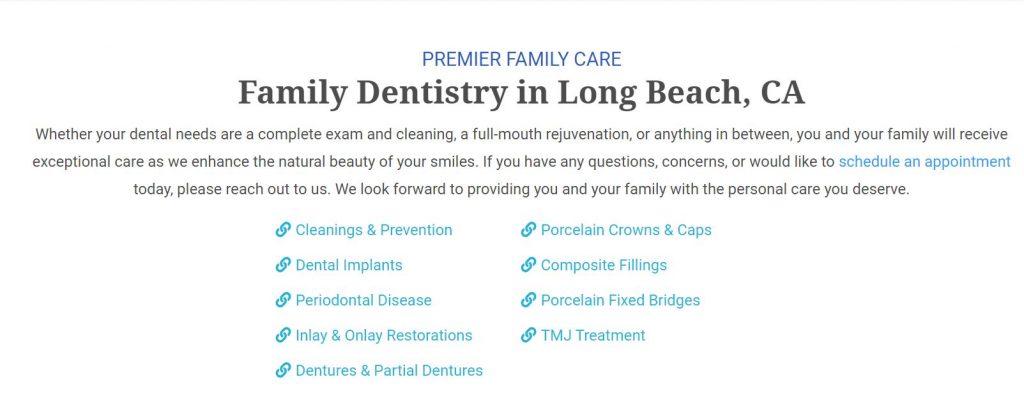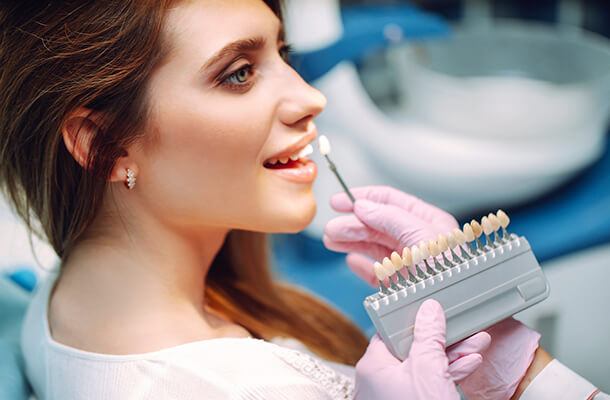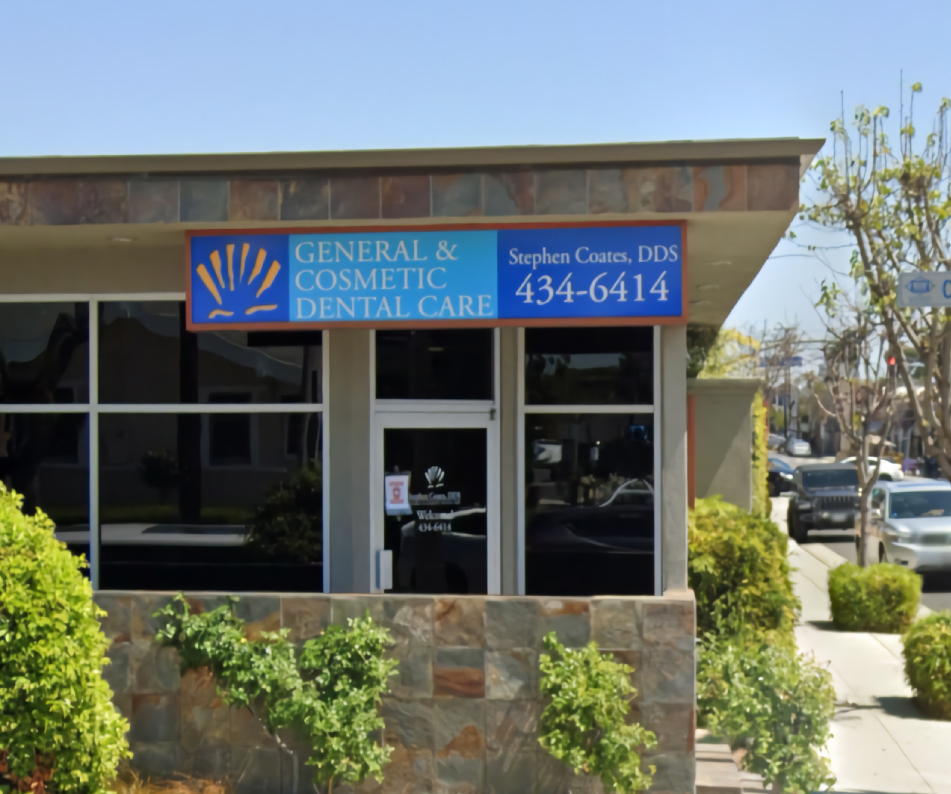Families who have children, elderly parents or simply wish to treat everyone in their family should consider visiting a Stephen Coates DDS as an ideal option.
By having the same dentist for all members of your family, it can help alleviate anxiety about dental visits and keep track of everyone’s health history.

Cleanings & Prevention
When searching for a dentist to care for your entire family, consider joining a family dental group. These typically feature two general dentists and an orthodontist who work together to guarantee everyone has access to top-notch dental services.
Family dentistry primarily focuses on preventive care. This includes comprehensive oral exams, teeth cleanings, x-rays and treatments to combat premature decay.
At a regular cleaning, the doctor or hygienist will remove any plaque or tartar that cannot be eliminated through brushing and flossing alone. They also polish the teeth to eliminate any stains that have developed over time.
These appointments are essential in preventing cavities and gum disease, which could result in tooth loss. Furthermore, they help identify issues like halitosis (bad breath) before they become serious issues.
Routine cleanings and preventive visits can help slow the progression of gingivitis, a mild form of gum disease caused by bacteria buildup in the mouth. Symptoms include pain, redness, and bleeding in the gums.
Dental Implants
Dental Implants are an advanced solution to replace missing teeth. They look and function just like natural teeth, offering you a natural-looking alternative.
Additionally, they help maintain the jawbone and slow bone deterioration. If you’ve lost one or more teeth, this means you are less likely to develop facial deformities due to bone loss.
Your regular dentist may suggest dental implants as a tooth replacement option, but will usually refer you to specialists such as oral surgeons and periodontists for the actual procedure. They will then craft the final restoration that sits atop the implants, such as a porcelain crown, bridge or hybrid denture appliance like All-on-4.
No matter if you are a candidate for dental implants, rest assured that your general dentist will provide the highest quality care to ensure you are completely satisfied with the outcomes. Maintaining good oral hygiene is also key in avoiding further issues from arising.
If your family has many yellow or discolored teeth, whitening is an effective solution to brighten everyone’s smiles. Teeth whitening can lighten a person’s teeth color by two to seven shades.
Your teeth become discolored when stains accumulate on their surface or between crystalline enamel rods. This can happen due to various reasons, such as drinking coffee or wine, smoking, and genetics.
Whitening
A dentist typically employs a bleaching solution to eliminate both surface and deeper stains. This typically consists of hydrogen peroxide or carbamide peroxide, an oxidizing agent.
Treatment usually requires one or two office visits, depending on the severity of your stains and desired outcomes. Your dental team can advise you if you are an ideal candidate for whitening and how long it should take to achieve desired outcomes.
If you opt for professional whitening, your dentist will create trays that fit inside your mouth like mouthguards and dispense a whitening gel tailored specifically to your teeth. These trays can be customized for each tooth’s needs and contain various concentrations of carbamide peroxide.

Periodontal Disease
Periodontal disease is a chronic, progressive infection of the gum tissue and bone surrounding your teeth that, if left untreated, could lead to tooth loss as well as an increased risk for heart disease.
In a healthy mouth, gum tissue and bone provide strong support for your teeth. But when plaque builds up, bacteria can invade the spaces between teeth and gums.
Gums become inflamed and irritated from this exposure, leading to an infection known as periodontitis. Bacteria then breeds within pockets between your gums and teeth, creating an environment perfect for bacteria to breed and colonize – leading to periodontitis – an uncomfortable condition that requires medical intervention to resolve.
As the infection progresses, toxins released by bacteria begin to destroy the supporting tissues that keep your teeth in place. Not only does this infection destroy your gums, it may also weaken your immune system, leaving you more susceptible to other health problems such as diabetes and heart disease.
Fortunately, your family dentist can help prevent this condition from developing. Regular cleanings and exams can detect early signs of gingivitis or periodontitis, which can then be treated before it worsens.
Dentures & Partial Dentures
Dentures are an effective solution to replace missing teeth and improve chewing. They are custom-made in a dental laboratory from impressions taken of your mouth.
Patients can select either full dentures or partials, depending on how many teeth they have lost. Partials fill in gaps between teeth while full dentures replace an entire arch of missing teeth.
Both types are manufactured to look and function just like natural teeth. A well-fitted denture not only looks great, but it can also restore your confidence when eating the foods you love.
Dentures are customized to match the color and shape of your gums, so they blend in seamlessly with other teeth. Furthermore, dentures are easy to keep clean and maintain for optimal aesthetic benefits.
Dentures require several appointments, including highly accurate impressions and a wax rim try-in. At the final fitting appointment, your dentures will be perfectly shaped and fitted to your bite.
Porcelain Crowns & Caps
Porcelain crowns & caps are custom-made to protect damaged teeth from further decay or injury, as well as strengthen and improve the aesthetic appeal of your smile.
Ceramic or porcelain crowns closely replicate your natural tooth, offering the perfect match in color and shape. They’re often chosen for front teeth restoration projects and remain the most popular type of crown available today.
Gold alloy or base metal crowns are often recommended for molars or back teeth as these teeth experience stronger bite and grinding forces. Unfortunately, they can be difficult to clean, and may not look as natural as porcelain crowns do.
All-ceramic or all-porcelain crowns can be customized to match the color of your teeth and are less prone to breakage than resin crowns. Furthermore, these types of dental crowns last longer than other options.
All-resin crowns tend to be cheaper than their porcelain or all-ceramic counterparts, but they wear down faster. Furthermore, they may cause a dark line on your teeth when you smile or laugh.
Porcelain Fixed Bridges
If you have lost a tooth or several teeth due to injury, disease, or other reasons, porcelain fixed bridges can restore your smile’s health and functionality. These restorations are custom-shaded and shaped to match the color and shape of your natural teeth for an esthetic match that looks and functions just like natural teeth.
Porcelain is ideal for dental bridges as it doesn’t corrode or lose its shine over time like some other materials can. On average, porcelain bridges last anywhere from eight to ten years with proper oral hygiene habits and regular visits to Dr. Fixari’s office.
Traditionally, a bridge consists of two crowns that cover the abutment (anchor) teeth on either side of the gap, followed by a false tooth (pontic) to fill in the space.
Porcelain fixed bridges are an increasingly popular solution for replacing missing teeth, as they last so long and look so natural. Furthermore, these prosthetics require little upkeep when cleaning and require only minimal attention.
Veneers
Veneers are ultra-thin covers that your dentist can use to conceal minor cosmetic flaws with your teeth. Usually made of porcelain or composite resin, veneers can be shaped to look and feel just like natural teeth for added comfort and strength.
Your dentist will first clean and prepare your teeth to make them more suitable for veneers, if needed. They may also reshape them slightly if necessary.
Once they receive your model of teeth, they’ll send it to a dental laboratory where veneers will be created. Finally, they apply the new veneers using strong bonding agent and UV light for permanent coverage.
Once the veneers are in place, your dentist will inspect them and assess fit. If they’re suitable, your dentist can apply a temporary veneer so you can wear them while permanent ones are being made.
The longevity of veneers depends on how well you maintain them, but most people can expect theirs to last around 15 years. Unfortunately, the bond between the veneers and natural teeth weakens with age, so eventually replacement may be necessary.




